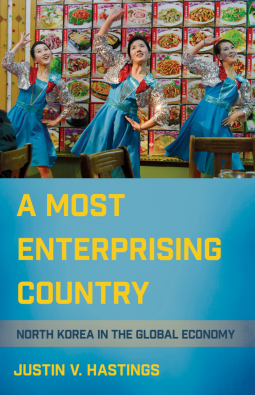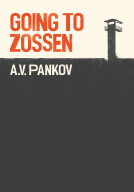
A Most Enterprising Country
North Korea in the Global Economy
by Justin V. Hastings
This title was previously available on NetGalley and is now archived.
Send NetGalley books directly to your Kindle or Kindle app
1
To read on a Kindle or Kindle app, please add kindle@netgalley.com as an approved email address to receive files in your Amazon account. Click here for step-by-step instructions.
2
Also find your Kindle email address within your Amazon account, and enter it here.
Pub Date Dec 06 2016 | Archive Date Dec 20 2016
Description
North Korea has survived the end of the Cold War, massive famine, numerous regional crises, punishing sanctions, and international stigma. In A Most Enterprising Country, Justin V. Hastings explores the puzzle of how the most politically isolated state in the world nonetheless sustains itself in large part by international trade and integration into the global economy. The world's last Stalinist state is also one of the most enterprising, as Hastings shows through in-depth examinations of North Korea’s import and export efforts, with a particular focus on restaurants, the weapons trade, and drug trafficking. Tracing the development of trade networks inside and outside North Korea through the famine of the 1990s and the onset of sanctions in the mid-2000s, Hastings argues that the North Korean state and North Korean citizens have proved pragmatic and adaptable, exploiting market niches and making creative use of brokers and commercial methods to access the global economy.North Korean trade networks—which include private citizens as well as the Kim family and high-ranking elites—accept high levels of risk and have become experts at operating in the blurred zones between licit and illicit, state and nonstate, and formal and informal trade. This entrepreneurialism has allowed North Korea to survive; but it has also caused problems for foreign firms investing in the country, emboldens the North Korean state in its pursuit of nuclear weapons, and may continue to shape the economy in the future.
Advance Praise
Available Editions
| EDITION | Other Format |
| ISBN | 9781501704901 |
| PRICE | $29.95 (USD) |
| PAGES | 240 |
Links
Average rating from 7 members
Featured Reviews
 Joseph S, Reviewer
Joseph S, Reviewer
Most Enterprising Country: North Korea in the Global Economy by Justin V Hastings is an economic look at the isolated country of North Korea. Hastings is currently a Senior Lecturer in International Relations and Comparative Politics in the Department of Government and International Relations at the University of Sydney, where he is also affiliated with the Sydney Southeast Asia Centre, the China Studies Centre, and the Centre for International Security Studies,
Over the past several years, there have been quite a few scholarly books on North Korea. There is a developing interest in the country that keeps its internal workings hidden from the world while at the same time making outlandish threats. During the Cold War, after the Korean war, North Korea remained in the background. The Soviets were a much bigger threat and they managed to keep their allies in line. Once the Cold War ended, North Korea rose as a threat and one of the three members of the Axis of Evil. China still holds North Korea as an ally probably out of Cold War communist nostalgic loyalty, even though China has economically moved on. North Korea has become that loud mouth kid on the playground that does as he pleases because others are afraid of his big brother and since he is more of an annoyance, rather than a threat, no one really stands up to him. It's not worth the risk.
Most books on North Korea end up repeating the same stories mostly from a handful of defectors. The good and bad in that is although first-hand accounts, they are first-hand accounts of people wanting to leave and making a case for asylum. Hastings takes a different approach and looks at trade. Most trade leaves a trail-- buyers, sellers, and transporters. Trade creates an interesting picture of North Korea. Kim Il Sung concentrated his efforts into heavy industry which served North Korea well. It was ahead of South Korea economically. Once the Soviet Union fell, North Korea lost its oil and fuel. It's industries stalled and fell into decay. Without outside help, North Korea's brief worker's paradise came to a sudden end.
North Korea learned how to play its friends as well as its enemies. Playing the Soviet Union against China ensured more than adequate financial support. Playing on the South Korea's want for unification has allowed North Korea to take advantage of that want financially. North Korea's insistence on continuing its nuclear program has lead to severe sanctions from most of the world. Even China has stepped up in writing the latest round of UN sanctions against North Korea.
North Korea uses deception on the outside and threats of prison or death on the inside. The diplomatic corps is responsible for supporting itself as well as providing for Pyongyang. Diplomats have been arrested for drug trafficking and North Korea produces a great deal of methamphetamine since the disruption the opium trade. It is also a masterful crafter of counterfeit US currency. Overseas North Koreans also work as brokers between parties arranging deals for profit. Diplomats must use their positions to set up contacts and even fake corporations to acquire needed components and technology. Recently, Taiwan has become a trading partner. Without a seat in the UN, it is free to enter trade with North Korea.
Internally, the Aurous March created and opening for small markets amid the starvation. The people are caught in a cult of personality and fear. The entire economy is created to feed the top. It is layered and each layer through bribes or profit is required to provide for the elite. The country relies on institutionalized corruption inside the country. Even foreign investors feel the pinch or get cut off despite agreed on deals. North Korea has raw materials to offer but no infrastructure to reach them. Investors pay for development then get shut out. There is also export labor to China where the government profits on lending out laborers. Perhaps the most surprising of North Korea’s exports -- Restaurant chains.
Most Enterprising Country provides a unique look into North Korea and at it survival when almost all the world stands against them. External trade leaves a trail that can be followed and tracked. Hastings follows the trail and provides a unique and accurate picture of North Korea today.
 Mandy J, Reviewer
Mandy J, Reviewer
A very-well researched and accessibly written exploration of North Korea’s position in the global economy and how it has managed, in spite of its self-imposed isolation, to continue to trade world-wide and establish trade networks all over the world. The book challenges the usually accepted view that North Korea is so isolated and closed that it cannot function in the global economy with any success, and proves that it can, and indeed does. The book gives a balanced view of the country and seeks to explain the economic situation there and I found it eye-opening and intriguing. A lot obviously goes on that I doubt many people are aware of except those directly involved. I learnt a lot from this book and was particular pleased that its tone is measured and unbiased and simply expository. A very useful addition to our knowledge about this most intriguing and inscrutable of countries.
Readers who liked this book also liked:
Rachel Joyce
Historical Fiction, Literary Fiction, Women's Fiction


















